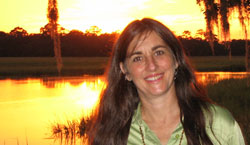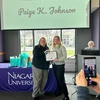 Writer Janice Ray is a defender of the longleaf pine ecosystem. |
Janisse Ray, acclaimed writer, naturalist, and activist, will visit SUNY Fredonia to do a public reading from her works, followed by a meet-the-author and book signing session.
The event will take place on Tuesday, March 2, at 7:00 p.m. in McEwen Hall G26; it is free and open to the public. Light refreshments will be served.
While on campus, Ray will also address Professor Aimee Nezhukumatathil’s Environmental Literature class and speak to a group of biology students about the longleaf pine ecosystem, a place that she loves and seeks to protect.
Ray is best known as the author of Ecology of a Cracker Childhood, a memoir about growing up on a junkyard in the ruined longleaf pine ecosystem of the Southeast. Besides being a plea to protect and restore the beautiful pine flatwoods of the South, the book looks at family, mental illness, poverty, and fundamentalist religion. Winner of an American Book Award and a Southern Book Critics Circle Award, the memoir was also selected as a New York Times Notable Book.
Ray’s other books include Wild Card Quilt: Taking a Chance on Home, a memoir of Ray’s return to her rural childhood home in Southern Georgia, and Pinhook: Finding Wholeness in a Fragmented Land, the true story of a 750,000-acre wildland corridor between south Georgia and north Florida.
Ray’s essays have appeared widely in such periodicals as Audubon, Orion, Natural History, and Oprah Magazine, and in anthologies including Southern Solutions and The Norton Anthology of Nature Writing. She has been a commentator for Vermont and Georgia Public Radio and a writer-in-residence at Keene State College and the University of Mississippi.
Ray also lectures on nature, community, agriculture, wildness, sustainability and the politics of wholeness.
Ray lives a simple, sustainable life on a family farm in southern Georgia. She uses her writing to explore the close connections among nature, culture, and place. Widely traveled as an organizer and activist, Ray works to create sustainable communities, local food systems, a stable global climate, clean rivers, and life-enhancing economies.



